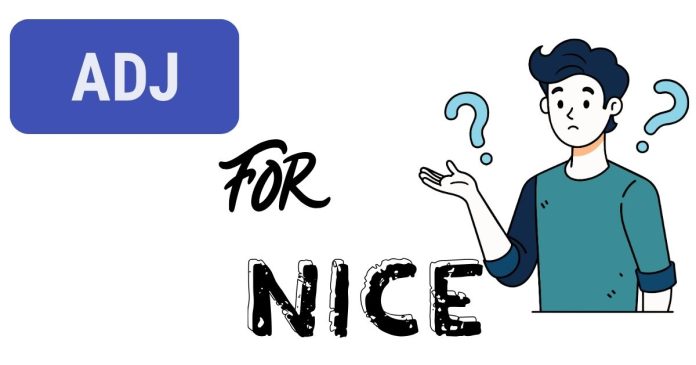The word “nice” is itself an adjective, commonly used to describe something pleasant, kind, or satisfactory. However, there are many other adjectives that can be used in place of “nice” depending on the specific meaning or context. Let’s explore synonyms for “nice” and when to use them.
Understanding “Nice” as an Adjective
“Nice” is a versatile word, but it can be somewhat vague. For example:
- Describing a person: She is a nice person.
- Describing an experience: We had a nice time at the party.
- Describing an object: That’s a nice piece of art.
While “nice” is adequate, choosing more descriptive adjectives can add depth and precision to your language.
Synonyms for “Nice”
Here are some adjectives that can replace “nice” based on context:
1. For People:
- Kind: Highlights a person’s generosity and care.
Example: She is a kind and thoughtful teacher. - Friendly: Describes someone approachable and warm.
Example: The neighbors were very friendly. - Charming: Refers to someone with an appealing and charismatic personality.
Example: He’s such a charming host.
2. For Experiences:
- Pleasant: Indicates something enjoyable or agreeable.
Example: It was a pleasant day for a picnic. - Delightful: Emphasizes a high level of enjoyment.
Example: The concert was absolutely delightful. - Enjoyable: Highlights satisfaction or fun.
Example: The trip to the beach was enjoyable.
3. For Objects:
- Beautiful: Refers to physical attractiveness or elegance.
Example: That’s a beautiful painting. - Elegant: Describes something stylish or sophisticated.
Example: The room had elegant decor. - Appealing: Suggests that something is attractive or inviting.
Example: The restaurant has an appealing ambiance.
4. General Synonyms:
- Wonderful: Describes something extraordinary or remarkable.
Example: The view from the top of the mountain was wonderful. - Lovely: A softer, more affectionate term for “nice.”
Example: The flowers are so lovely. - Great: A stronger, more enthusiastic alternative to “nice.”
Example: She’s a great friend.
When to Use More Specific Adjectives
While “nice” is a good all-purpose word, using more specific adjectives can enhance your communication. For instance:
- Instead of saying, “The movie was nice,” you could say, “The movie was entertaining” or “The movie was captivating.”
- Instead of saying, “He’s a nice person,” you might say, “He’s a compassionate person.”
This level of specificity helps convey your thoughts more clearly and vividly.
“Nice” is a simple and versatile adjective, but there are many alternatives that can better suit different contexts. Whether you’re describing a person, experience, or object, choosing a more precise adjective can make your writing or speech more engaging and effective. Next time you’re tempted to use “nice,” consider selecting a synonym that adds more nuance to your description!


